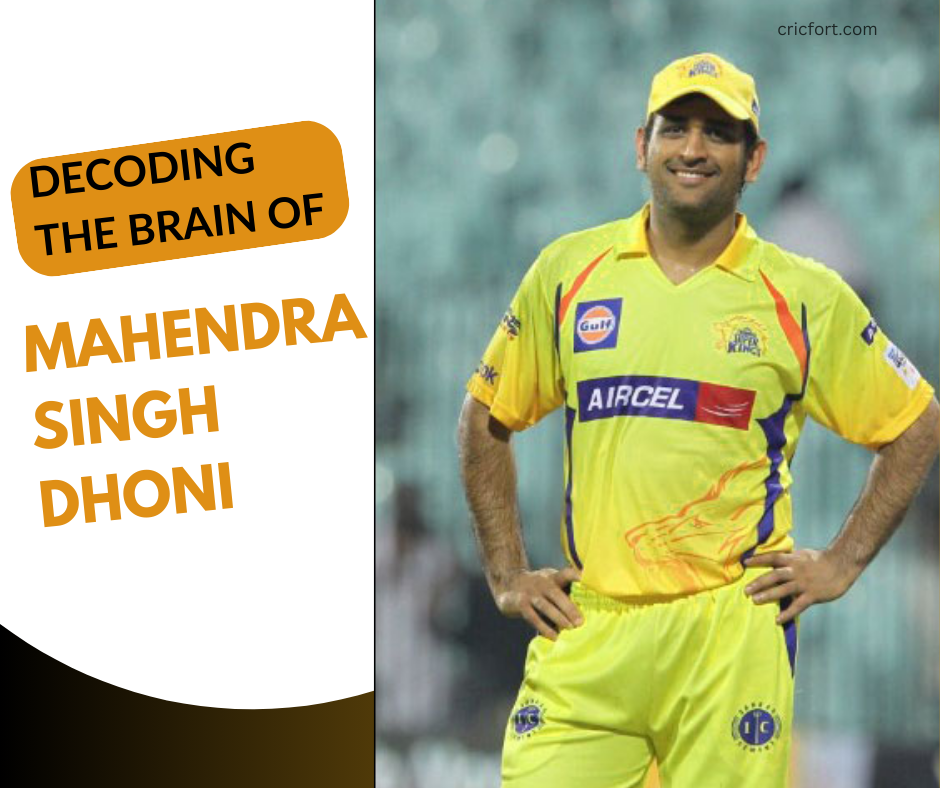Inside the Mind of a Champion: Understanding Dhoni’s Mental Game

Mahendra Singh Dhoni, widely recognized as MS Dhoni, is not just a name but a phenomenon in the world of cricket, celebrated for his unparalleled skills, strategic planning, and remarkable leadership as the former captain of the Chennai Super Kings and the Indian national team. His debut in 2004 marked the beginning of a new era in cricket, showcasing his emotional intelligence and ability to perform under pressure, traits that have carved him a niche in the annals of cricket history as one of the sport’s most influential figures. Understanding Dhoni’s mind offers insight into the making of a champion, shedding light on how his unique approach to the game has led to numerous victories and accolades.
Exploring the mental framework of Dhoni involves delving into his calm demeanor under pressure, innovative strategies, and decisions that have changed the course of matches and, by extension, cricket itself. This article sets out to unpack the elements of Dhoni’s mental game, from his tenure with the Chennai Super Kings to captaining the Indian national team to glory. Through a structured examination of his leadership style, the importance of mental toughness, and his enduring legacy, readers will gain a comprehensive understanding of why Mahendra Dhoni is considered a beacon of strategic planning and emotional intelligence in the high-stakes world of international cricket.
The Calm Under Pressure
MS Dhoni’s unparalleled calmness under pressure is not just a trait but a meticulously cultivated skill, central to his success on the cricket field. His approach combines mental discipline, experience, and a rigorous preparation regime, making him a master of maintaining composure in the most intense situations. Here’s how Dhoni achieves his legendary calm:
- Mental Conditioning Techniques:
-
- Mindfulness and Meditation: Dhoni regularly practices mindfulness and meditation, enhancing his focus and presence in the moment.
- Visualization and Breathing Exercises: These help him visualize success and manage physiological responses to stress.
- Emotional Resilience: Developing a positive outlook and resilience against setbacks is key to his mental fortitude.
- Experience and Preparation:
-
- Learning from Experience: Dhoni’s vast experience allows him to anticipate game scenarios, reducing anxiety.
- Preparation: Rigorous practice and strategy sessions ensure he’s well-prepared, boosting his confidence under pressure.
- Philosophy and Tactical Acumen:
-
- Balanced Perspective: Viewing winning and losing as parts of the game helps maintain emotional equilibrium.
- Focus on the Process: Concentrating on the process rather than the outcome aids in staying present and reduces pressure.
- Decision-Making: His ability to detach from the game’s outcome enables clear, rational decisions even in high-stakes moments.
Dhoni’s calm demeanor is a testament to his mental toughness and strategic planning, embodying the essence of a champion who thrives under pressure.
Strategic Innovations
MS Dhoni’s approach to cricket is a blend of instinct, innovation, and strategic planning. His ability to assess situations and adapt his strategies accordingly has set him apart as a leader and a tactician. Here’s a closer look at the strategic innovations that have defined Dhoni’s career:
- Calculated Risks & Decision-Making:
-
- Takes calculated risks based on experience and knowledge, focusing on the process rather than the outcome.
- Analyzes factors such as boundary sizes, wind direction, and batsmen’s strengths against specific bowlers to make informed decisions.
- Known for brilliant matchups by recalling specific information about a player’s weaknesses and executing potentially risky strategies with calmness and self-belief.
- Unique Techniques & Adaptability:
-
- Dhoni’s wicket-keeping and batting techniques are described as unconventional yet effective, backed by impressive statistics.
- Constantly seeks fresh approaches, unafraid to experiment with new tactics, showcasing adaptability and innovation.
- Leadership & Team Building:
-
- Emphasizes strategic thinking as a collective responsibility among players, encouraging and backing his team to make crucial contributions.
- Defined specific goals for the team, such as improving fitness levels, which led to the emergence of new talent like Virat Kohli and Rohit Sharma.
- Promoted Rohit Sharma as an opener, changing his career trajectory and contributing significantly to the team’s success.
Dhoni’s strategic acumen, combined with his ability to innovate and adapt, has been instrumental in his and his teams’ successes, making him a revered figure in cricket.
Leadership Style
MS Dhoni’s leadership style is a rich tapestry of instinct, rational decision-making, and unwavering support for his team. His approach is multifaceted, blending mental resilience with a deep understanding of the game, and is characterized by several key principles:
- Instinct and Rationality:
-
- Trusts his gut feelings in crucial moments.
- Balances instinct with thorough analysis and rational thought.
- Support and Freedom:
-
- Encourages team members to express themselves without fear.
- Places immense trust in players, allowing them to take ownership of their roles.
- Mental Resilience:
-
- Remains composed and focused, irrespective of the game’s intensity.
- Harnesses his humble beginnings as a source of strength and determination.
- Process-Oriented Philosophy:
-
- Advocates focusing on the process rather than obsessing over results.
- Believes in preparation, practice, and perseverance.
- Strategic Decision-Making:
-
- Reads the game with acute awareness, making informed strategic calls.
- Examples include key match moments like instructing specific bowlers to adopt certain delivery styles, leading to pivotal victories.
Dhoni’s leadership transcends the cricket field, inspiring not just players but individuals in various walks of life to lead with humility, focus, and conviction. His legacy is a testament to the power of leading by example, maintaining calm under pressure, and valuing teamwork over individual accolades.
Game-Changing Decisions
MS Dhoni’s game-changing decisions have often been the turning point in crucial matches, reflecting his strategic mind and ability to leverage his team’s strengths. His decisions, rooted in pragmatism and experience, have not only led to significant victories but also showcased his leadership and foresight. Here are some of the key decisions that highlight Dhoni’s impact on the game:
- Strategic Field Placements and Bowling Changes:
-
- 2007 ICC World T20 Final: Opting for Joginder Sharma for the last over against Pakistan, despite having an experienced bowler like Harbhajan Singh. This bold move secured India the championship.
- 2013 Champions Trophy Final: Bringing Ishant Sharma to bowl the 18th over against England, which resulted in crucial wickets and shifted the game’s momentum in India’s favor.
- Bold Batting Orders:
-
- 2011 World Cup Final: Promoting himself above Yuvraj Singh to bat at number 5, leading to a match-winning partnership with Gambhir and securing the World Cup for India.
- Adapting Roles: Dhoni’s decision to retire from Test cricket in 2014, focusing on limited-overs formats, demonstrated his understanding of his evolving role and strengths in the team.
- Team Composition and Future Planning:
-
- Dropping Sourav Ganguly and Rahul Dravid in 2008: A controversial yet effective decision aimed at improving fielding standards, leading to India’s first-ever tri-series win in Australia.
These decisions underscore Dhoni’s ability to assess situations and make calculated moves, turning potential 50/50 scenarios into advantages for his team. His legacy as a captain who could change the game’s outcome with his strategic planning and emotional intelligence continues to inspire.
The Importance of Mental Toughness
In the high-stress environment of international cricket, mental toughness becomes a pivotal attribute for success. Subramaniam Badrinath, a former teammate of MS Dhoni, underscores the significance of a focused and detached approach to the game, a philosophy Dhoni exemplifies. This mental fortitude is not innate but cultivated through rigorous mental conditioning, a practice Badrinath is keen to propagate through his initiative, MFore. This platform aims to bolster players’ mental resilience, motivation, and goal-setting capabilities, especially critical during challenging times such as the ongoing COVID-19 pandemic.
- Mental Conditioning Tools:
-
- Visualization: Players are encouraged to visualize their performance, aiding in goal reassessment and focus.
- MFore Initiative: Offers programs dedicated to enhancing mental toughness, endorsed by cricket professionals.
MS Dhoni himself has been vocal about the necessity of acknowledging and addressing the mental aspects of cricket. He advocates for the constant presence of a mental conditioning coach with the team, emphasizing that mental strength is as crucial as physical prowess. This sentiment is echoed by current Indian cricket team captain, Virat Kohli, who highlights the indispensable role of mental clarity and health not just in sports, but life in general.
Tatenda Taibu, the former Zimbabwe captain, and others in the cricketing world, attribute Dhoni’s success to his unparalleled mental toughness. This attribute was starkly evident when Dhoni candidly analyzed India’s shortcomings after a loss to Australia in the 2015 World Cup semi-final, showcasing his analytical and honest approach to the game. This blend of mental resilience, honesty, and strategic acumen underscores the importance of mental toughness in achieving peak performance, a lesson every aspiring cricketer can learn from Dhoni’s illustrious career.
Legacy and Impact on Indian Cricket
MS Dhoni’s legacy in Indian cricket is multifaceted, encompassing his disciplined daily routine, landmark achievements under his captaincy, and his enduring influence on future generations. His commitment to excellence is evident in his structured daily routine, which includes:
- Early Morning Practice: Prioritizing skill enhancement and technique refinement.
- Fitness Regimen: Emphasizing physical strength and agility.
- Mental Preparation: Utilizing meditation and visualization techniques.
- Study and Analysis: Reviewing game strategies and opponent tactics.
- Leadership and Team Bonding: Fostering a cohesive and motivated team environment.
- Balance and Family Time: Ensuring personal well-being and family integration.
- Philanthropic Endeavors: Contributing to societal welfare through various initiatives.
Under Dhoni’s leadership, India clinched several major tournaments, notably the 2007 ICC World Twenty20, the 2010 and 2016 Asia Cups, and the 2011 ICC Cricket World Cup. These victories not only elevated India’s standing in international cricket but also instilled a belief in the team’s capability to triumph in high-pressure situations.
Dhoni’s retirement in 2020 marked the end of an era, leaving behind a legacy that transcends his on-field achievements. As a philanthropist, businessman, and mentor, Dhoni continues to inspire aspiring cricketers and leaders, demonstrating that his impact on cricket and beyond will be felt for generations to come.
Conclusion
Throughout this exploration of Mahendra Singh Dhoni’s mind and methodology, we’ve journeyed through the facets that define him not just as a cricketer but as a vanguard of mental resilience and strategic prowess. His calm under pressure, innovative strategies, and instinctual leadership illuminate the path to becoming a champion in the high-stakes world of international cricket. The insights gleaned from Dhoni’s career—his mental conditioning, adept decision-making, and unshakeable calmness—offer a profound understanding of how emotional intelligence and strategic planning intertwine to forge a legacy that transcends the boundaries of the sport.
The significance of Dhoni’s impact on cricket and those aspiring to mirror his mental fortitude extends beyond mere victories. It encapsulates the essence of building a mindset that thrives on pressure, values the process over the outcome, and maintains a dynamic approach to leadership and innovation. As future generations look to Dhoni’s illustrious career for inspiration, the lessons drawn from his journey underscore the unparalleled importance of mental toughness and strategic acumen in achieving excellence not just on the cricket field, but in all walks of life. His story is a testament to the enduring legacy of a true champion, whose influence will resonate for years to come.

